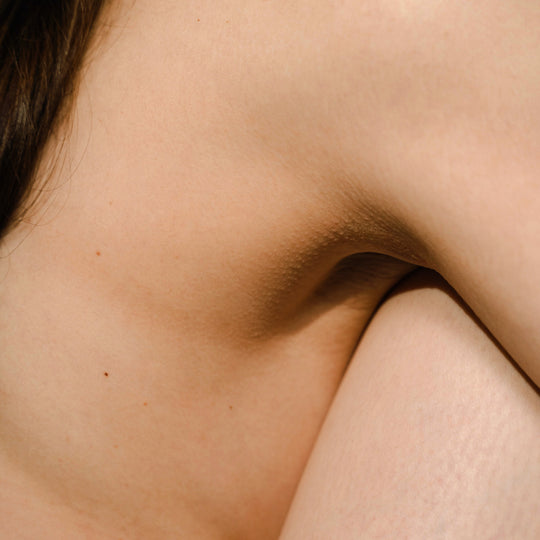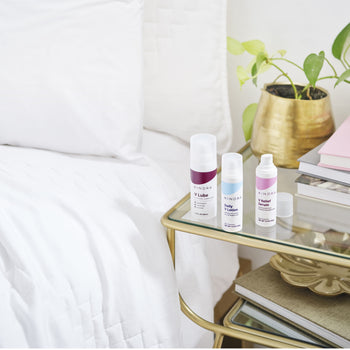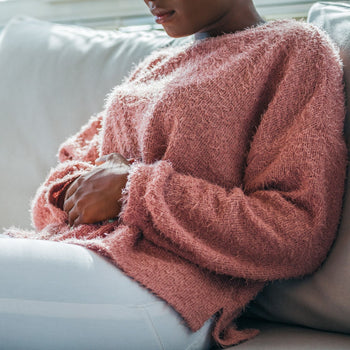Having tender, sore breasts are one of the hallmark symptoms of early pregnancy. But if you’re in your late 40s and feeling the same thing…hate to break it to you, but that’s actually a common menopause symptom.
A lot happens to your boobs during this time of life, including soreness. Usually, this is a benign (albeit frustrating) symptom to add to the list of stuff you deal with during the menopause transition. But some breast changes during menopause may require more attention from a health-care provider. Here’s everything you need to do.
What Causes Sore Breasts During Menopause?
Breast soreness isn’t something that just happens during menopause; a full two-thirds of women experience it before reaching menopause. For some, it feels like a dull, aching pain while others may describe it as heaviness, tightness, discomfort, or burning. In some people, only one breast is affected, while in others it happens to both equally. Other people can feel pain and tenderness in their underarms, too. Anyone with breasts can experience breast soreness—not just women. Also, let’s get this straight right away: Having sore breasts does not mean you have breast cancer.
A major cause of breast soreness is, surprise surprise, fluctuating hormone levels throughout the menstrual cycle. This is called cyclic breast pain. Some women experience this type of breast soreness every month in the leadup to their period.
Rebecca Brightman, M.D., an assistant clinical professor of obstetrics, gynecology, and reproductive services at the Icahn School of Medicine at Mount Sinai, says that breast soreness is also common during pregnancy because of elevated levels of estrogen and progesterone. (Hormonal birth control can also cause breast soreness.)
When breast soreness happens outside of the menstrual cycle, it is called non-cyclic breast pain. Some of the causes are straightforward and temporary, like if you had surgery on the area or were injured there in some way. “A change in workout routine with strain to the chest muscles can also create sensation of breast tenderness,” Dr. Brightman adds. Costochondritis, aka inflammation of the cartilage in the rib cage, is also a common cause of noncyclic breast pain and soreness.
So why would someone in perimenopause or menopause experience breast soreness? Once again, it can be due to hormonal changes. (You knew that was coming, right?) “While it is somewhat counterintuitive, women who are perimenopausal experience hormonal shifts and at times have very high estrogen levels,” Dr. Brightman says, which may cause soreness. “After menopause, estrogen levels are very low, yet some women experience soreness.” Up to 20 percent of postmenopausal women also experience an increase in breast size thanks to changes in body fat, which Dr. Brightman says can cause soreness as well.
Other Common Breast Changes During Menopause
Besides soreness, there are other ways breasts can change during menopause. “Many women experience breast growth and some experience the opposite,” Dr. Brightman says. “[Some women] may notice that their breasts aren't as full as they were prior to menopause and that they tend to sag.” That’s due to the loss of estrogen, which helps support connective tissues in your breasts to keep them full and firm.
If you’re on hormone therapy, you might experience more breast cysts—small, fluid-filled sacs inside the breasts. It’s not really known what causes breast cysts, but experts believe it has something to do with hormonal changes (shocker!). Usually, these cysts are benign, but if you feel one, it’s important to see your OB/GYN to get it checked out.
How to Deal With Breast Soreness During Menopause
If you are experiencing breast soreness during menopause, there are some ways to ease your pain:
1. Try a B6, magnesium, or vitamin E supplement
“Some women notice a decrease in symptoms with B6 or magnesium supplements,” Dr. Brightman says. Research shows that vitamin E supplements can also help with cyclic mastalgia. Just confirm with your health-care provider that these supplements won’t interfere with other medications or supplements you already take.
2. Try an over-the-counter pain reliever
Dr. Brightman says taking an over-the-counter pain killer, like ibuprofen, can also be helpful. Ibuprofen is an anti-inflammatory, which can help reduce swelling along with pain.
3. Get fitted for a new bra
Don’t underestimate the power of a well-fitted bra. Remember, breast size can go up or down during menopause, so it makes sense that you may need some new bras. “Many women experience menopausal weight gain and fat redistribution which can result in an increase in breast size. A properly fit bra is a game changer for these women,” Dr. Brightman says.
4. Try a heating pad
Heat therapy can work wonders for pain and soreness. Apply a covered heating pad to the sore area and feel the relief sink in.
5. Changes to hormone replacement therapy
“If someone experiences post menopausal breast tenderness while on hormone replacement, sometimes changing the formulation may improve symptoms,” Dr. Brightman says. Talk to your doctor to see what adjustments they can make to your prescription.
6. Consider a prescription medication
If breast soreness is greatly impacting your daily life, consider talking to your doctor about taking a prescription medication. “In situations of extreme breast tenderness, I recommend that women discuss this with their health-care providers as there are medications that we sometimes prescribe to minimize water retention,” Dr. Brightman says, adding that water retention can cause swelling, leading to soreness.
7. Self-care
Dealing with breast soreness can be stressful, so using relaxation techniques, such as meditation, could be helpful. In Traditional Chinese Medicine, frankincense essential oil has long been used for pain relief, so consider incorporating that into your relaxation time.
In positive news: Experts used to believe that consuming caffeine, alcohol, and overly processed foods made breast soreness worse, but researchers have found there to be less of a connection than many may think. (So keep sipping that latte if it brings you joy!)
When to See a Doctor About Breast Soreness
As mentioned, having sore boobs and no other symptoms is not a sign of breast cancer. That said, there are times when you do want to see a doctor about it. If you notice sudden or new, unexplained tenderness, Dr. Brightman says it’s best to book an appointment. The same goes for if the tenderness is occurring in only one breast or you notice any additional breast changes, like swelling, a mass, redness, or if you have a fever.
When you go in for an appointment for breast soreness, Dr. Brightman says you can expect the doctor to perform a manual breast exam. If they believe that further testing should be done, they will order a mammogram, sonogram, or breast MRI.
Regardless of if you are experiencing breast soreness or not, it’s important to get regular mammograms every year after turning 45, and every two years after age 55. (If you have specific risk factors, like a family history of breast cancer, your doctor might have you get screened more often.) When it comes to breast cancer, early detection is key and mammograms help do exactly that.
Outlook for Post Menopause
Dr. Brightman says that breast soreness typically improves post-menopause, but not always. “Some women do have periodic soreness after menopause,” she says.
“The most important thing is that women shouldn't be alarmed,” Dr. Brightman says. “Breast tenderness, particularly when bilateral—when it occurs in both breasts—is rarely worrisome.” That said, it can be frustrating, so if it is getting in the way of you living your normal life, talk to your doctor about it. Chances are, they will be able to offer some solutions that can help minimize the pain.
Sources
American Cancer Society. American Cancer Society Recommendations for the Early Detection of Breast Cancer. January 2022.
Breastcancer.org. Mastalgia (Breast Pain). June 2022.
de Cassia da Silveira e Sa, R., et al. International Journal of Molecular Sciences. Analgesic-Like Activity of Essential Oil Constitutes: An Update. December 2017.
Hubbard, T. et al., British Journal of General Practice. Breast pain: assessment, management, and referral criteria. August 2020.
Idiz, C. et al., European Journal of Breast Health. The Role of Nutrition in Women With Benign Cyclic Mastalgia: A Case Control Study. July 2018.
Johns Hopkins Medicine. Breast Pain (Mastalgia). Undated.
Mayo Clinic. Breast Cysts. January 2023.
National Breast Cancer Foundation. Breast Pain. April 2020.
National Cancer Institute. Understanding Breast Change. Accessed 4/29/22.
National Library of Medicine. StatPearls. Mastalgia. November 2022.
National Library of Medicine. StatPearls. Mastodynia. June 2022.
National Library of Medicine. StatPearls. Oral Contraceptive Pills. November 2022.
Penn Medicine Lancaster General Health. Do Breasts Undergo Changes With Menopause? May 2015.
Shobeiri F. et al., Iranian Journal of Nursing and Midwifery Research. Clinical effectiveness of vitamin E and vitamin B6 for improving pain severity in cyclic mastalgia. Nov.-Dec. 2015.
Tonkelaar, I. et al., Maturitas. Increase in breast size after menopause: prevalence and determinants. May 2004.












